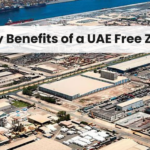Introduction
The United Arab Emirates (UAE) has become one of the world’s major trade and commerce centers. Its geographic advantage, amazing infrastructure, and trade friendly policies attract companies to export and import their products. Whether you are a startup entering global markets or an existing business looking to increase your reach, UAE import and export market gives amazing opportunities.
The UAE’s airports, ports, and free zones all promote international trade. From Jebel Ali Port, a massive global port, to Dubai International Airport, the nation makes sure that business is supported by the logistics they require to grow.
In this blog, we will give a detailed, step-by-step guide to importing and exporting commodities in the UAE and other necessary information .
Why UAE is Ideal for Import and Export Businesses
Strategic Location
- The UAE’s strategic location connecting Asia, Europe, and Africa gives it access to around the world markets.
Business-Friendly Policies
The government has introduced business-friendly rules that attract global businesses:
- Free Zones: Provide 100% foreign ownership, tax holidays, and streamlined customs.
- Low Import Duties: 5% duty for most goods, and a few categories are duty-free.
- Ease of Licensing: Simplified procedures enable companies to begin trading promptly.
Advanced Infrastructure
UAE offers world-class logistics infrastructure, such as:
- Warehouses and cold storage.
- customs clearance systems
- Global transport networks linking ports, airports, and cities.
Step-by-Step Process to Import Goods in UAE
Define Your Business Activity
Define your business before beginning:
- Import Only: Importing merchandise into the UAE for selling domestically.
- Export Only: Exports of domestically produced goods outside UAE.
- Import & Export: Conducting both domestic and foreign trade
This affects the license type and customs procedure.
Select Legal Structure
Choose between Mainland, Free Zone, or Offshore based on:
- Ownership preference (100% foreign or UAE partner).
- Nature of goods and target markets.
- Licensing fees and ease of administration.
Get Trade License
- Mainland: Apply through the Department of Economic Development (DED).
- Free Zone: Apply through the concerned Free Zone Authority (e.g., JAFZA, DMCC).
Documents to be submitted:
- Owner passport copy
- UAE visa and Emirates ID
- Business plan and approval of company name
- Evidence of office lease and address
Register with UAE Customs
Registration with Federal Customs is required for all importers to obtain a Customs Code or E-Registration Number.
Product Regulations & Approvals
| Product Type | Regulatory Body | Requirement |
| Food & Beverages | Dubai Municipality | Health certificates, labeling compliance |
| Pharmaceuticals & Medical | Ministry of Health | Import permit, quality control |
| Electronics | ESMA | Compliance certificate, safety standards |
| Chemicals | Ministry of Environment | Hazard handling and transport approval |
Find Suppliers
- Research global suppliers through trade shows, online B2B sites, or distributors.
- Discuss payment
Shipping & Logistics
- Select a sound freight forwarder.
- Select from air, sea, or land routes.
- Create a packing list, invoice, bill of lading/airway bill, and insurance documents.
Customs Declaration
Submit import declaration online through UAE Customs.
Documents required:
Commercial invoice, packing list, certificate of origin, bill of lading, import permit.
Duties & Taxes
- Import duty: Typically 5% of CIF (Cost + Insurance + Freight) value.
- VAT: 5% for the majority of imported goods.
- Certain goods are free of duty in free zones or under GCC agreements.
Receive Goods
- After customs clearance, the goods arrive in your warehouse.
- Keep accurate records for audits and compliance.
Step-by-Step Guide to Exporting Goods from UAE
Check Export License
- Confirm that a trade license allows export business.
- Free zones tend to offer export-specific trade licenses for simpler procedures.
Find International Buyers
- Market research, trade fairs, and B2B websites.
- Sign contracts, negotiate payment terms and Incoterms.
Prepare Goods to Export
Accurate packing, marking, and quality inspection.
Certificates:
Certificate of Origin, health certificates (food), or ESMA compliance (electronics).
Logistics & Shipping
- Book cargo through a freight forwarder.
- Select air, sea, or land transportation.
- Organize insurance and shipping documents.
Export Declaration
- Submit export declaration online to UAE Customs.
- Pay any export fees if required.
Delivery to International Buyer
- Destination country customs clearance by freight forwarder or local partner.
- Comply with destination country’s import regulations.
UAE Free Zones for Import and Export
Free zones provide major advantages to import/export companies:
| Free Zone | Key Advantages | Suitable Business Types |
| JAFZA | Largest logistics hub, container handling, 100% ownership | Trading, manufacturing |
| DMCC | Precious metals, diamonds, commodities | Commodity trading |
| SAIF | Fast setup, cost-effective | SMEs, general trading |
| Dubai CommerCity | E-commerce imports/exports | Online retail and trading |
Documents Needed for Import / Export
Common Documents
- Commercial Invoice
- Packing List
- Certificate of Origin
- Bill of Lading / Airway Bill
- Import/Export Permit (if necessary)
Special Documents
- Health Certificate (food)
- ESMA Compliance Certificate (electronics)
- Ministry of Environment Approval (chemicals)
Costs and Duties
| Cost Component | Details |
| Import Duty | Usually 5% CIF value |
| VAT | 5% on most imported goods |
| Free Zones | Often duty-free for re-exported goods |
| Shipping & Insurance | Based on weight, volume, and transport mode |
| Clearance Fees | Paid to customs and freight forwarders |
Minor Issues in UAE Trade
- Incorrect Documentation: Results in delays at customs.
- Non-Compliance: ESMA or local regulations can shut out imports.
- High Shipping Costs: Particularly for urgent shipments.
- Regulatory Changes: UAE regularly modifies trade rules.
Tips for import export in UAE
- Engage competent freight forwarders and customs brokers.
- Keep precise records of all transactions.
- Comprehend regulations for certain product groups.
- Make use of Free Zones for cost savings.
- Schedule logistics and shipping in advance to prevent delays.
Conclusion
The UAE remains among the most competitive places for international trade, offering its geopolitical location, infrastructure, amazing business regulations, and Free Zones dedicated to international trade. For companies that want to start or grow in the UAE, primarily a function of four fundamentals: securing the correct licenses, remaining compliant with trade regulation, accurate record-keeping documentation, and strategic planning of logistics and customs tariffs.
By taking advantage of Free Zones, companies are able to benefit from relief from taxation, accelerated establishment, and easier import export procedures. Meanwhile, careful planning especially in terms of shipping routes, customs clearance, and regulatory compliance facilitates smoother trade procedures and prevents avoidable costs or delays.
Ultimately, if organizations have the right knowledge, preparation, and strategic alliances, they can tap into the UAE’s distinctive advantages to expand globally, diversify their supply chain, and become competitive global players.
Looking to import and export in the UAE? Contact E-Startup for expert guidance, affordable packages, and a hassle-free setup.
REFERENCES LINKS
- Dubai Customs – https://www.dubaicustoms.gov.ae/
- Jebel Ali Free Zone (JAFZA) – https://jafza.ae/
- Dubai Multi Commodities Centre (DMCC) – https://www.dmcc.ae/
- Emirates Authority for Standardization & Metrology (ESMA) – https://www.moiat.gov.ae/en/
- Dubai CommerCity – https://www.dubaicommercity.ae/
FAQs for Import Export Business in UAE
1. What license is required for import export business in UAE?
To start import export in UAE, you need a trade license. Businesses can apply through the Department of Economic Development (Mainland) or Free Zone authorities such as JAFZA, DMCC, or Dubai CommerCity.
2. How much does it cost to start an import export business in UAE?
The cost varies between AED 15,000 to AED 35,000 depending on the Free Zone or Mainland setup, license type, office space, and other approvals.
3. What are the import duties in UAE?
Import duty is typically 5% of the CIF value (Cost + Insurance + Freight). Some goods are exempt, and Free Zone companies importing goods for re-export enjoy duty-free benefits.
4. What is the VAT rate on imported goods in UAE?
Most imported goods attract 5% VAT, payable at customs during clearance. However, VAT-exempt goods (such as some healthcare or educational products) are excluded.
5. Can a Free Zone company import goods into Mainland UAE?
Yes, but Free Zone companies must appoint a local distributor or clearing agent to move goods into the UAE mainland and pay applicable customs duties.
6. What documents are required for importing goods in UAE?
Key documents include a commercial invoice, packing list, certificate of origin, bill of lading/airway bill, customs import declaration, and any product-specific certificates (health, ESMA, MoH approvals).
7. How do I export goods from UAE?
You need an export license, buyers’ contracts, certificate of origin, export declaration, packing list, and logistics arrangements with a freight forwarder for international shipping.
8. Which are the best Free Zones for import export in UAE?
Top Free Zones include JAFZA (general trading), DMCC (commodities), Dubai CommerCity (e-commerce), and SAIF Zone (SMEs & cost-effective trading).
9. What challenges should importers/exporters expect in UAE?
Common issues include incorrect documentation, sudden regulatory changes, high shipping costs, and delays in customs clearance if approvals are missing.
10. Why choose UAE for international trade?
The UAE offers strategic global connectivity, business-friendly policies, advanced logistics infrastructure, and 100% foreign ownership in Free Zones—making it ideal for global traders.












